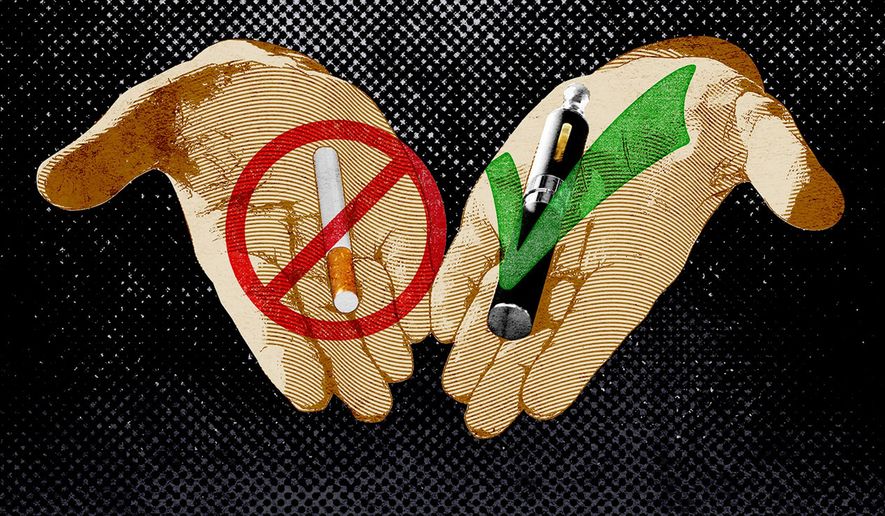OPINION:
Thirty years ago, as a young public health researcher and professor, I would begin my lectures by telling students that 480,000 Americans die from cigarette smoking every year, making it the leading cause of preventable death. Sadly, 30 years later, I still begin my talks with the same fact. In those 30 years, 15 million Americans have died unnecessarily from cigarette smoking. To change this trajectory, it is time for the FDA to embrace bold, new thinking, including offering smokers safer nicotine-containing alternatives.
It’s almost impossible to comprehend that 15 million people have been lost over the past 30 years to cigarette smoking. To many of us, these people are nameless and faceless. In fact, the majority tend to be people of color, those from lower socioeconomic status, those with dual addictions and those with co-occurring mental health disorders. Those without a voice.
The historical Tobacco Control Act, passed in 2009, was supposed to be a tipping point and set the stage to save millions of lives. Unfortunately, it has not lived up to that promise. Many of the FDA’s initiatives, like graphic warning labels, are stalled in courts. Other FDA proposals will likely take years to play out. The menthol ban has yet to occur, even though it was first considered in 2011. And while FDA has finally proposed a ban on menthol this year, that too will likely be delayed in the courts (though I think that will be a losing battle for the industry).
Another recent proposal by the FDA to establish a maximum nicotine level in cigarettes will likely not produce the results FDA wants. The concept here is to establish a cap on nicotine in cigarettes so that they are no longer addictive. This is not a new idea. Twenty-eight years ago, scientists proposed establishing a nicotine threshold for addiction. Since then, we have learned a lot more about nicotine and have conducted additional studies using reduced nicotine cigarettes. In fact, one company, 22nd Century, is test-marketing a reduced nicotine cigarette called VLN (very low nicotine).
To date, sales have been “modest.” That is not surprising, as such low levels of nicotine will significantly alter a smoker’s experience. If we accept that a smoker primarily uses cigarettes for nicotine, then it is hard to believe that smokers would buy a product that does not meet their needs. One might conclude that is good — they would then quit smoking cigarettes. Is it that simple? While I tend to think the tobacco industry often exaggerates the black-market concept, in this case, I think it is a very real concern. And who would use these black-market products? People of color and lower socioeconomic populations. There would likely be a robust nicotine market that is not regulated, not taxed and possibly adulterated.
To make real and meaningful progress in addressing the tremendous toll of cigarette smoking, it’s critical that the FDA authorize lower-risk nicotine products, such as e-cigarettes and nicotine pouches, alongside a portfolio of approved smoking cessation medications.
In 2017, Scott Gottlieb, the FDA Commissioner, along with Mitch Zeller, the director of the FDA’s Center for Tobacco Products at the time, acknowledged the need for the FDA’s approach to tobacco regulation to consider the continuum of risk for nicotine-containing products. For example, e-cigarettes (or vapes) and nicotine pouches are increasingly showing that they can help smokers quit. While these products are not safe, many believe they are significantly safer than combustible cigarettes.
Just as public health has embraced harm reduction concepts for opioids, alcohol and many other public health areas, we must embrace it for tobacco products too.
Sadly, while FDA acknowledged the importance of tobacco harm reduction, that does not seem to be the direction the agency is moving. Recently, the FDA issued market denial orders to JUUL, meaning the product must be removed from the market. Today, 3 million American smokers use JUUL. What message are we sending, that these 3 million Americans should smoke cigarettes? Switch to other e-cigarettes that may also receive the same market denial order a few months from now?
It may be hard for many to appreciate, but nicotine is not the devil; cigarettes are. And when nicotine is combined with cigarettes, it joins the devil. As renowned researcher Michael Russell famously said, “People smoke for the nicotine, but they die from the tar.” I implore policymakers and the FDA to remember this.
To be the voice for vulnerable populations, and to truly embrace the concept of reducing harm, alternative nicotine products may be the game changer we have needed to save lives. Isn’t that the story we want to tell the next generation of public health students 30 years from now?
• Dr. Jasjit Ahluwalia, one of five nonfederal employees on the Surgeon General’s Interagency Committee on Smoking.




Please read our comment policy before commenting.